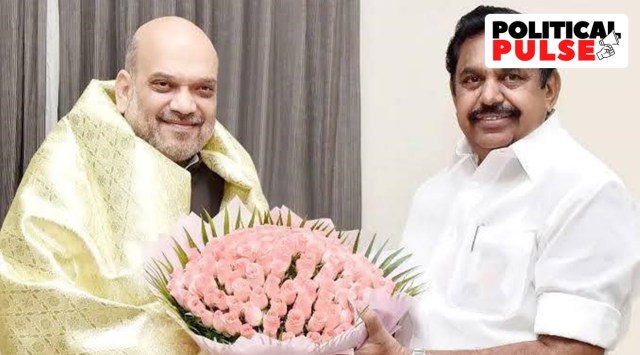Uniform Civil Code: Now BJP ally AIADMK says it is opposed, wary of alienation of minorities
Edappadi K Palaniswami's opposition to Uniform Civil Code is said to be not just about reiterating AIADMK's stand but also reflects party's concerns over its long-term prospects
 The AIADMK, a BJP ally, reiterated its opposition to the UCC. (Facebook: Eddapadi K Palaniswami)
The AIADMK, a BJP ally, reiterated its opposition to the UCC. (Facebook: Eddapadi K Palaniswami) Amid a raging debate over the proposal for a Uniform Civil Code (UCC) in the country, the principal Opposition of Tamil Nadu, the AIADMK, a BJP ally, on Wednesday reiterated its opposition to the UCC.
When asked about his party’s stand on the UCC, AIADMK general secretary and Leader of the Opposition (LoP), Edappadi K Palaniswami or EPS told reporters, “Our stand on UCC is explained clearly in our election manifesto of 2019. Read it carefully, and you will understand it clearly.”
At the helm of the government in 2019, then Chief Minister EPS and Deputy CM O Panneerselvam or OPS had insisted that the Narendra Modi-led NDA government should not implement the UCC.
The AIADMK manifesto for the 2019 Lok Sabha elections touched upon the UCC issue a couple of times. In its chapter 14 titled “Secularism”, the manifesto stated, “AIADMK will urge the Government of India not to bring any amendments to the Constitution for a Uniform Civil Code that will adversely affect the religious rights of minorities in India.”
In its chapter 21 titled “Minorities Welfare”, the AIADMK manifesto stated, “The AIADMK will urge the Government of India not to make the Common Civil Code applicable to the religious minorities, to protect their religious rights, as safeguarded by our Constitution.”
In his first public push for a UCC, Prime Minister Modi, while addressing a BJP booth-workers’ rally in Bhopal on June 27, had said that the country cannot have separate laws for its people and that the Constitution obligates the State to secure a UCC for its citizens.
The PM made this pitch days after the 22nd Law Commission sought the views of public and religious organisations over the UCC. Subsequently, several minority and tribal communities have opposed the UCC. A slew of Opposition parties have opposed it too.
A UCC is envisaged to provide one law for the entire country for all religious communities in their personal matters such as marriage, divorce, inheritance, adoption, child custody, alimony and polygamy, etc.
On Tuesday, Vice-President Jagdeep Dhankhar, while underlining that a UCC will “bind” the country together, said that “any further delay in implementation” of the UCC will be “corrosive” to “our values”.
The AIADMK has become the first NDA ally to express its opposition to the proposed UCC, thereby posing a challenge to the saffron party. Earlier, the AIADMK had claimed that one of the reasons for the party’s defeats in the 2019 Lok Sabha elections and 2021 Assembly polls was its alliance with the BJP which, it complained, “alienated minorities”.
Observers say Palaniswami’s stand on the UCC was not just about upholding the AIADMK’s earlier line but also reflected the party’s long-term concerns as it may review its alliance with the BJP after the 2024 elections.
In the 2019 Lok Sabha polls, the UCC was not an issue in Tamil Nadu, although both the DMK and the AIADMK, among other parties, took a stand against it to reassure the minorities.
The issue made ripples in the 2016 Assembly elections, when a third front involving the Left parties was also in the fray. Under the then party supremo late J Jayalalithaa’s leadership, 40 MPs of the AIADMK had opposed the UCC in Parliament and outside.
In 2003, the AIADMK, then known for aligning with the BJP on various ideological matters, appealed to the Central government to implement a common civil code, calling it a “necessity”. This was underscored in a resolution passed during the party’s executive meeting, which stated that a common civil code was a demand of not just political and social justice, but also of natural justice.
However, a senior AIADMK leader and ex-minister, requesting anonymity, told The Indian Express that the UCC was never a key issue in the state even during the period of the late M G Ramachandran, the film star-turned-party founder and ex-CM. “Although the original Shah Bano case dates back to the 1970s, it was never a key topic in Tamil Nadu. The state has always upheld a native ‘Tamil’ identity as robust as any minority identity, with caste issues often dominating the debates next to Tamil issue,” the leader said.
“The game-changer,” the leader said, “was the Meenakshipuram conversion incident in 1980 near Tirunelveli when over 800 Dalits converted to Islam. I am of the belief that the BJP as we know it today wouldn’t exist if Meenakshipuram hadn’t occurred. It was a watershed moment in Indian and South Indian politics. It was the first event of its kind that turned a religious matter into a public issue in Tamil Nadu, where previously caste dominated discussions, not religion.”
Explaining the reasons for the AIADMK’s opposition to the UCC despite its alliance with the BJP, the leader said, “At present, the AIADMK cannot sustain itself in Tamil Nadu if it alienates minorities. Even if we have to maintain a necessary arrangement with the BJP in the 2024 Lok Sabha elections, we don’t see it as a long-term option. They will not be our allies in the 2026 Assembly polls.”
Photos




- 01
- 02
- 03
- 04
- 05



























